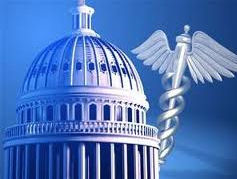What is Obamacare - Facts and Details: Morality Meets Reality

National Healthcare: A Moral Concept in a Real World
from the Curmudgeon's desk: GA Anderson
The public debate over President Obama's National Healthcare plan, (Obamacare), facts is usually framed as a battle between the moral vs. the greedy, the caring vs. the selfish, duty vs. choice, a battle with no gray areas, you are either right or you are wrong. Viewing Obamacare details from only such polarizing positions as these creates a major stumbling block to finding a path to a goal that both sides agree is admirable and right.
But the noble morality of the goal must be addressed in the reality of the world we live in, the truths of human nature, and of course, the concept of The American Way.
The Morality of Providing Healthcare
The concept that healthcare should be available to everyone is hardly a debatable point. Of course it's an admirable goal, and in an ideal world it would be a reality.
But we do not live in an ideal world - yet, so national healthcare questions must be addressed in the context of the real world we do live in.
The premise that healthcare is a God-given right is also a debatable point. Very debatable. Non-believers can rightly point out that you can't be given something from something that doesn't exist. America is a nation of both believers and non-believers.
The proclamation that it is a Human right is also hotly contested. Who decides just what Human rights are? Where do they come from? It's obvious, and everybody knows, are not acceptable answers.
The declaration that it is our government's responsibility to ensure that everyone has healthcare is a question of degrees. How much healthcare does this duty require be provided? Enough to be life-saving, or whatever is needed to be life-enhancing?
So even giving the point that morally we should want everyone to have access to healthcare, those are just a few of the basic questions that need answers in order to define the limits of this morality.
The Reality of National Healthcare
The reality of providing healthcare is that it is not free. It has both monetary and human costs. It isn't a commodity you get free from a magic well, it is a service that can only be provided by other humans. And that is the basis of the argument of most people that oppose national healthcare. Not that they don't think it's a worthy goal - but who's going to pay for it?
Reality also requires that the question of degrees of healthcare be answered. Should a national healthcare plan, paid for by everyone, be only for life-saving healthcare? Should it also provide healthcare that improves someone's quality of life, (re: medical issues)? Or should it include every type of healthcare service available - hair transplants, anti-aging treatments, bionic limbs, cosmetic procedures that make you feel better about yourself?
That is the reality of a national healthcare plan - who will pay for it, and what is the scope of services provided.
It might be reasonably ventured that most Americans would support a national healthcare plan that would ensure emergency life-saving medical care - reasonable because it already exists. Contrary to the picture painted by the most ardent supporters of a national healthcare plan, U.S. law already mandates that hospitals and medical service providers must render emergency medical service regardless of a patient's ability to pay. And it isn't just life-threatening medical needs that are served. Walk into any medical services emergency room with a broken bone, severe cut, or even a fever, and medical treatment will be given - regardless of healthcare insurance coverage or ability to pay. Or even citizenship.
Americans that oppose Obamacare are not immoral and compassionless people, they just don't want to be forced to pay for someone needs without a choice.
But Healthcare is a Right in an Enlightened Society
For proponents of the argument that healthcare is a right, perhaps the following logic will determine the correctness of that belief.
Start with a few "givens" -
- Medical care can only be provided by people - the example of machines and devices that can provide medical services is a false one - people had to develop them first
- Providing medical care has a cost - either in time or money
- Every human is on an inevitable march to death and has a finite number of minutes in their life before they reach the end of their journey.
- The adage "time is money" could also be stated "time has value" - with regards to human life and endeavers
Given those basic truisms, then the assertion that a person has a right to healthcare is the same as asserting that someone has a right to a portion of someone else's life. That is an argument that probably has very little support among rational freedom-loving people.
To expand on that point:
- A doctor has a life expectancy of "X" number of minutes, so every minute spent providing medical care is a minute less of life they have for living as they choose. But this is also true for any endeavor in anyone's life - people just choose to trade life minutes for other values. From earning money, to thrilling adventures, quiet time reading to quality time playing with the grandchildren, people are always making choices are how to spend their minutes of life. But it is important to note that it is a choice - people choose how to spend their life's minutes.
- A doctor's day is filled with providing medical services - but that was their choice of careers, of how they wanted to spend their life minutes. They also provide those services for an exchange of values, either for money which enhances their quality of life, or for free, which is a choice they make for whatever value it gives them.
Those that see healthcare as a right are saying that a doctor must provide healthcare services regardless of their choice. And without benefit of value exchange.
They say, "I have a right to healthcare - you must see me and provide for my medical needs. I can't pay you, and I'm a lousy specimen of a human being that doesn't really deserve to be in the company of decent people, but healthcare is my right. So you must see me."
If healthcare is a right, then the doctor will have no choice. Whether it is only a five minute office visit or a two hour consultation, that is life minutes that doctor has to spend - with no choice or value exchange in the matter. In essence someone saying they have a right to healthcare is the same as saying they have the right to a portion of someone else's life.
Really? What about the doctor's right to choose how they spend their life? Which right is trump? And what about plumbers? No one is claiming a right to running water, so a plumber doesn't have to worry about some one claiming a right to a portion of their life. Why should the plumber be more free than the doctor?
The Government Should Pay for Healthcare
Then there is the argument that being an American citizen includes the right to healthcare, so the government should pay for it. Again, really? What money should the government use to pay for healthcare? It doesn't have any money that it doesn't take from its taxpayers, so the truth is that saying the government should pay for it is the same as saying the taxpayers should pay for it. Your neighbor Bob is a taxpayer, just hand him your medical bills. That's fair isn't it?
The purpose of taxation is to support the legitimate functions of government. If providing healthcare is a legitimate function of government, why hasn't it been done before this? Why wasn't it stated in the constitution? Why is it a legitimate function now, and not in 1796?
Healthcare is an admirable and desirable goal - but it is not a right. Government can have a role in ensuring healthcare is available to all its citizens, there are measures it can take to facilitate the provision of healthcare, but it is not a mandated government responsibility, and it is not a burden to be arbitrarily placed on the shoulders of all citizens.
Government can help achieve the goal of national healthcare services
The current imbroglio of the national healthcare debate is only a symptom of the mess our political system is in. Special interests, bought politicians, intransigent positions, and short-sightedness are the main reasons the national healthcare issue is as divisive and contentious as it is.
All-or-nothing and scrap-it-and-start-anew proposals are deal killers. Moderation and common-sense incremental steps are what will work. The U.S. already has a working model in place - MediCare. It is aware of problem areas that if fixed could save hundreds of millions of dollars - a good first step for the seed money needed for expansion of healthcare services, and the problems of influence-peddling and special interest corruption are in the news daily, so healthcare reform is possible - if the obvious problems are just addressed first.
But until then...
Healthcare is not a right. It is not a duty of government. And it is not something the government can do better than the private sector. As long as our political system is as corrupted as it is now - and always has been, a national healthcare plan can only be instituted as an enforced obligation, which will never be accepted as legitimate by a free and rational populace.
Morality... meet reality.

See more GA Anderson Political articles


About the author
Writing for the Daily Constitutional, and commentary from the Curmudgeon's desk - GA Anderson
"Seeing it does not make it real, and reading it does not make it true. Use a little common-sense and trust your instincts." - GAA
*Composite image component source citations: Creative Commons images from:commons.wikimedia.org, flickr.com/creativecommons, search.creativecommons.org, http://googlesystem.blogspot.com/2009/06/find-creative-commons-images-in-google.html. *photo and image source credits: divider and separation images - http://gaanderson.hubpages.com







![American Politics: The BIG LIE in Politics, From The Republican Presidential Convention [124] American Politics: The BIG LIE in Politics, From The Republican Presidential Convention [124]](https://images.saymedia-content.com/.image/t_share/MTc2NDYyMjI1MzEyNjU1MzIy/the-big-lie-in-politics-from-the-conservative-side.jpg)

